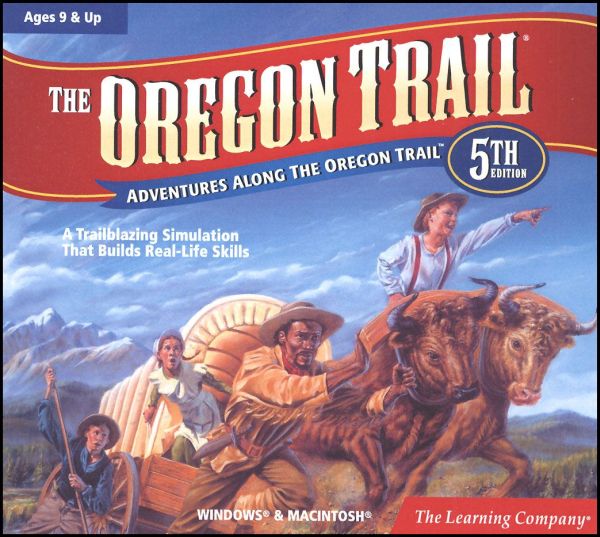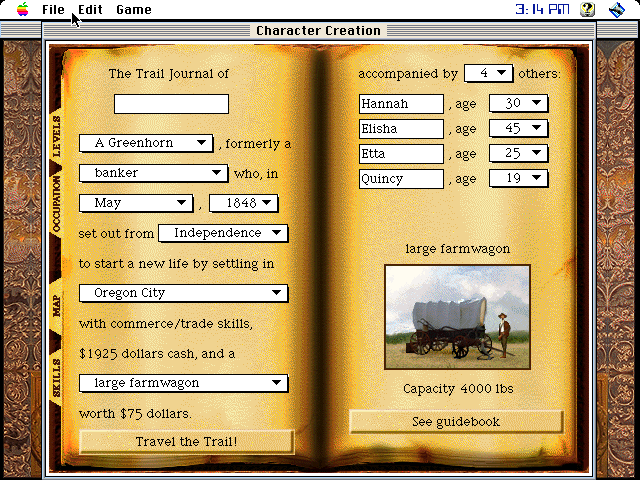

- #THE OREGON TRAIL 5TH EDITION WEIGTHT LIMIT HOW TO#
- #THE OREGON TRAIL 5TH EDITION WEIGTHT LIMIT FREE#
In the last decade, serious games grew exponentially. Other breakthrough games were DARWARS introduced in 2003 and the VBS1 in 2005. Sawyer considered America’s Army “the first successful and well-executed serious game that gained total public awareness”. The game simulates military training exercises and combat missions, with the goal of promoting the American army and as a recruitment tool for young people between the ages of 16 and 24.

#THE OREGON TRAIL 5TH EDITION WEIGTHT LIMIT FREE#
In 1996, the Marine Doom game was used to train members of the US Marine Corps.Ī first-person shooter game, named America’s Army, was developed by the US army and distributed free of charge over the Internet in 2002. The years 19 saw the release of several arcade games such as Pole Position, as well as games for the Atari VCS 2600 console, such as Pepsi Invaders, which included elements of advertising (a type of application that today is known as an “advergame”). This application was developed by a team from Atari and was based on the Battlezone arcade game, which is believed to be the first virtual reality arcade game.
#THE OREGON TRAIL 5TH EDITION WEIGTHT LIMIT HOW TO#
In 1981, a simulation tool known as The Bradley Trainer was developed for the American army to train new recruits in how to operate a Bradley tank. It stands as an example of a successful serious game. Lemonade Stand, which was created in 1973, focused on business management, while The Oregon Trail, produced in 1974, intended to teach users about American colonists and was very popular and is still popular today through mobile phones and Facebook. Later on, in 1973, educational games such as The Oregon Trail and Lemonade Stand were produced by the Minnesota Educational Computing Consortium (MECC). The advertising of one of the world’s first commercial home video game consoles, the Odyssey by Magnavox (launched in the USA in 1972), emphasized the device’s potential as an educational tool, and thus it might be considered one of the first serious video games. Milestones in the history of serious games.įurthermore, links between the military and gaming are far from new: during World War II, the US army general staff were the first to use “wargames” and employed them to improve their image with the population. The concept of serious games was first coined by Abt and described as follows: “We are concerned with serious games in the sense that these games have an explicit and carefully thought-out educational purpose and are not intended to be played primarily for amusement.” He used innovative gaming approaches to improve education for the physical and social sciences, occupational choice and training, and planning and problem solving in government and industry. In recent history, several landmarks have marked the development of serious games as summarized in Table 1 and described in this section and can probably be considered milestones in the history of serious games. However, most games were based on the concept that the game contains and reveals knowledge that is otherwise hidden from the player. Some of these games already served a “serious” purpose for example, Mancala (a game designed around 1400 BC) was used as an accounting tool for trading animals and food. For instance, Dice appears to be among the earliest games used by humans, the oldest known example is a 3000 year old game set in south Iran. The idea of playing a game dates to the ancient past and is considered an integral part of all societies. Finally, the paper provides guidelines, drawn from the literature, for the design and development of successful serious games, as well as discussing research perspectives in this domain. We also propose a taxonomy for digital serious games, and we suggest a classification of reviewed serious games applications from the literature against the defined taxonomy. Hence, we discuss relevant work on serious games in different application areas including education, well-being, advertisement, cultural heritage, interpersonal communication, and health care. So far, there has been little work done to survey digital serious games in general, which is the main goal of this paper. There are many surveys in the field of digital serious games however, most surveys are specific to a particular area such as education or health. Serious games are growing rapidly as a gaming industry as well as a field of academic research.


 0 kommentar(er)
0 kommentar(er)
